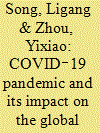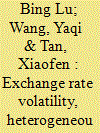|
|
|
Sort Order |
|
|
|
Items / Page
|
|
|
|
|
|
|
| Srl | Item |
| 1 |
ID:
173745


|
|
|
|
|
| Summary/Abstract |
The COVID‐19 pandemic broke out at a time when there were heightened uncertainties in the global economy. Understanding these uncertainties provides an important background for analyzing the impact of the pandemic on the global economy, assessing the effectiveness of policy measures in combating the pandemic and reviving the global economy, and predicting the trajectory of the economic recovery in the post‐pandemic era. We analyze how COVID‐19 would likely deepen an existing malaise in the global economy, and what could be done to address these problems while managing the economic recovery. We argue that three fundamental factors that could lead to a solid recovery in the post pandemic era are structural reform, new technology and re‐integration. They could be managed by instituting a new “global social contract.” Supported by strong public policies at all levels, especially at national level, these three factors could bring about the salvation of the global economy as it recovers or re‐emerges from the pandemic crisis.
|
|
|
|
|
|
|
|
|
|
|
|
|
|
|
|
| 2 |
ID:
173747


|
|
|
|
|
| Summary/Abstract |
With the gradual promotion of market‐oriented reform of the RMB exchange rate, the fluctuation range of the RMB exchange rate is increasing. How to deal with the impact of exchange rate volatility on Chinese exports is an important challenge faced by China. This paper finds that although exchange rate volatility, as a whole, has a negative impact on exports, high‐productivity exporters are less prone to exchange rate volatility shock in both intensive and extensive margins. As high‐productivity firms are less affected by exchange rate risk, they account for larger market shares. This paper, from a new perspective, provides evidence that increasing productivity helps mitigate the negative impact of exchange volatility on exports.
|
|
|
|
|
|
|
|
|
|
|
|
|
|
|
|
| 3 |
ID:
173748


|
|
|
|
|
| Summary/Abstract |
China's financial market has undergone significant changes since financial deleveraging commenced and regulatory supervision was tightened in 2017. Intensifying China–US trade tensions have further increased the uncertainties of external environments. In this article, we use a Bayesian approach instead of the standard maximum likelihood estimation in the Laubach–Williams model to estimate the natural interest rate by considering financial factors and open conditions, and analyze the relationships among the natural interest rate, economic activities and monetary policies. We find that technological and demographic factors are the main drivers of natural interest rates, while financial factors and open conditions also play important roles. In particular, shocks in the financial markets and the external economic environment in recent years are important reasons for the decline of China's natural interest rate. Therefore, it is necessary to strengthen research on the estimation of the natural interest rate to ensure China's transformation into more price‐based monetary policy and high‐quality development.
|
|
|
|
|
|
|
|
|
|
|
|
|
|
|
|
| 4 |
ID:
173746


|
|
|
|
|
| Summary/Abstract |
This review paper provides a new narrative by combing through the experiences of structural transformation among developing countries and discussing the roles of government and market in different contexts. Country performance has been influenced by the prevailing development thinking: the structuralism in the 1950s–1970s, which stresses an active government's role to overcome market failures for industrialization, and the neoliberalism in the 1980s–present, which advocates for eliminating government failures to build up a well‐functioning market. We find that almost all countries failing by following structuralism in their industrialization and neoliberalism in their transition to a market economy, and the few countries successful in catching up have a few characteristics that go against the prevailing structuralism and neoliberalism. The new structural economics, generated from the experiences of successful East Asian economies and proposing active facilitating roles of government in a market economy to remove market failures, will gain traction and take root.
|
|
|
|
|
|
|
|
|
|
|
|
|
|
|
|
| 5 |
ID:
173749


|
|
|
|
|
| Summary/Abstract |
China's 2004 value‐added tax (VAT) pilot reform in the Northeast region, which changed the VAT from production type to consumption type, introduced a sizable tax credit for fixed investment in manufacturing industries, leading to more investment and higher productivity at firm level. This paper, however, uses difference‐in‐difference estimation and finds a negative structural effect; that is, the VAT pilot reform leads to a reduction in the export sophistication of Northeast cities relative to other cities in China, and the results hold for a battery of robustness checks. It is found that resources are reallocated towards less‐sophisticated industries. As the products with higher export sophistication are more skill and research and development (R&D) intensive, the shortfalls of skilled labor and R&D spending hinder the upgrading process. With a new round of revitalization plans in the Northeast, policymakers should be cautious with similar structural effects and focus on increasing skilled labor supply and R&D investment.
|
|
|
|
|
|
|
|
|
|
|
|
|
|
|
|
|
|
|
|
|